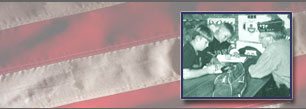How to Participate » Conduct the Interview
Conduct the Interview
It is the interviewer’s job to make the interviewee feel comfortable and to be a good listener. Remember that each interview session will be unique. Use the interview outline [PDF, 2.31MB] (see page 2) for ideas on what kinds of questions to ask and tailor them as you and the interviewee see fit. Make sure each interview lasts at least 30 minutes.
- State at the beginning of the interview:
- Your name and organizational affiliation (if any)
- Interviewee’s full name
- Date
- General location in which the interview is being conducted (Please do not disclose private information such as home address or military serial number)
- Interviewee’s relationship to you (if any)
- Names of the people attending the interview (including the camera operator)
- Purpose of the interview
For example: I am Jane Q. Public. I am representing XYZ Corporation. I am interviewing John William Smith on Saturday, June 7, 2014, at his home. John Smith is my uncle. He is my mother's brother. Also present with us is Jill Doe, who is operating the camera. This interview is being conducted for the Veterans History Project at the Library of Congress.
- Ask the interviewee to provide basic biographical details, including:
- Full name (First, Middle, Last)
- Date of birth
- Branch of service
- Highest rank attained
- War or conflict served
- Ask the interviewee to discuss his or her:
- Early days of service
- Wartime service
- Experiences at the end of the war/end of military service
- Personal reflections
- Other tips for conducting a great interview:
- Keep the audio- or video-recorder running throughout the interview, unless the interviewee asks you to turn it off. Never record secretly.
- Be respectful. Have a bottle of water and a box of tissues on hand in case the interviewee becomes emotional.
- Keep your questions short. Avoid complicated, multi-part questions.
- Avoid questions that can be answered with a simple "yes" or "no." Instead, ask "how,” “when” and “why" questions.
- Keep your opinions out of the interview, and do not ask leading questions.
- Encourage the interviewee by quietly nodding your head or by making affirmative eye contact rather than using audible responses such as "yes" or "uh huh" that will be recorded.
- Do not begin the interview with questions about painful or controversial topics.
- Be patient. Give the interviewee time to reflect before he or she responds to each question. Pause before moving on to a new question.
- Use follow-up questions to elicit more details from the interviewee.
For example: When did that happen? How did that make you feel? What did you think about that? What are the steps in doing that? Why did you make that decision?
- Consider asking the interviewee to show you photographs, commendations and personal letters as a way of enhancing the interview. Such materials often spark memories and provoke interesting stories.
- Do not put the interviewee on the spot about specific dates and locations. It is more important to record personal reflections than specifics.
- Be yourself. Do not pretend to know more about a subject than you do.
- If the interview is coming to an end in fewer than 30 minutes, ask the interviewee a few more questions to extend the conversation.
For example: Where were you and what were you doing on D-Day? How did the terrorists’ attacks of September 11, 2001 affect you? How would you compare today’s military to the military in which you served? How has participating in this interview made you feel?
- Complete final forms.
- Complete the required Audio and Video Recording Log [PDF, 92KB] to be submitted with the recording.
- If, in addition to the recording, the interviewee would like to donate original photographs, letters or other written materials, please remember to complete the Photograph Log [PDF, 110KB] and/or the Manuscript Data Sheet [PDF, 108KB].
How to Participate » Conduct the Interview |

